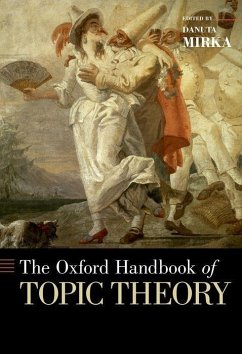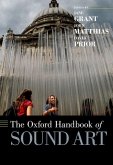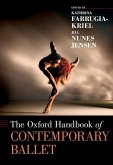Oxford Handbook of Topic Theory
Herausgeber: Mirka, Danuta
Oxford Handbook of Topic Theory
Herausgeber: Mirka, Danuta
- Broschiertes Buch
- Merkliste
- Auf die Merkliste
- Bewerten Bewerten
- Teilen
- Produkt teilen
- Produkterinnerung
- Produkterinnerung
The concept of musical topics describes the aural cross-references between styles and genres. The Oxford Handbook of Topic Theory grounds this concept in eighteenth-century music theory, aesthetics, and criticism, while also documenting historical reality of individual topics.
Andere Kunden interessierten sich auch für
![The Oxford Handbook of Philosophy in Music Education The Oxford Handbook of Philosophy in Music Education]() The Oxford Handbook of Philosophy in Music Education59,99 €
The Oxford Handbook of Philosophy in Music Education59,99 €![The Oxford Handbook of Sound Art The Oxford Handbook of Sound Art]() The Oxford Handbook of Sound Art205,99 €
The Oxford Handbook of Sound Art205,99 €![Oxford Handbook of Music and Virtuality Oxford Handbook of Music and Virtuality]() Sheila Whiteley (Professor Emeritus, Professor Emeritus, UniversityOxford Handbook of Music and Virtuality62,99 €
Sheila Whiteley (Professor Emeritus, Professor Emeritus, UniversityOxford Handbook of Music and Virtuality62,99 €![Oxford Handbook of Sound and Image in Digital Media Oxford Handbook of Sound and Image in Digital Media]() Oxford Handbook of Sound and Image in Digital Media58,99 €
Oxford Handbook of Sound and Image in Digital Media58,99 €![The Oxford Handbook of Neo-Riemannian Music Theories The Oxford Handbook of Neo-Riemannian Music Theories]() The Oxford Handbook of Neo-Riemannian Music Theories59,99 €
The Oxford Handbook of Neo-Riemannian Music Theories59,99 €![The Oxford Handbook of Ethical Theory The Oxford Handbook of Ethical Theory]() David Copp (ed.)The Oxford Handbook of Ethical Theory58,99 €
David Copp (ed.)The Oxford Handbook of Ethical Theory58,99 €![The Oxford Handbook of Contemporary Ballet The Oxford Handbook of Contemporary Ballet]() The Oxford Handbook of Contemporary Ballet239,99 €
The Oxford Handbook of Contemporary Ballet239,99 €-
-
-
The concept of musical topics describes the aural cross-references between styles and genres. The Oxford Handbook of Topic Theory grounds this concept in eighteenth-century music theory, aesthetics, and criticism, while also documenting historical reality of individual topics.
Hinweis: Dieser Artikel kann nur an eine deutsche Lieferadresse ausgeliefert werden.
Hinweis: Dieser Artikel kann nur an eine deutsche Lieferadresse ausgeliefert werden.
Produktdetails
- Produktdetails
- Oxford Handbooks
- Verlag: Oxford University Press Inc
- Seitenzahl: 706
- Erscheinungstermin: 1. August 2016
- Englisch
- Abmessung: 244mm x 170mm x 38mm
- Gewicht: 1262g
- ISBN-13: 9780190618803
- ISBN-10: 0190618809
- Artikelnr.: 47867236
- Herstellerkennzeichnung
- Libri GmbH
- Europaallee 1
- 36244 Bad Hersfeld
- gpsr@libri.de
- Oxford Handbooks
- Verlag: Oxford University Press Inc
- Seitenzahl: 706
- Erscheinungstermin: 1. August 2016
- Englisch
- Abmessung: 244mm x 170mm x 38mm
- Gewicht: 1262g
- ISBN-13: 9780190618803
- ISBN-10: 0190618809
- Artikelnr.: 47867236
- Herstellerkennzeichnung
- Libri GmbH
- Europaallee 1
- 36244 Bad Hersfeld
- gpsr@libri.de
Danuta Mirka is Reader in Music at the University of Southampton. She is the co-editor, with Kofi Agawu, of Communication in Eighteenth-Century Music. Her books include The Sonoristic Structuralism of Krzysztof Penderecki and Metric Manipulations in Haydn and Mozart: Chamber Music for Strings, 1787-1791, which won the 2011 Wallace Berry Award from the Society for Music Theory.
* Introduction
* Danuta Mirka
* Section I. Origins and Distinctions
* Chapter 1. Topics and Opera Buffa
* Mary Hunter
* Chapter 2. Symphonies and the Public Display of Topics
* Elaine Sisman
* Chapter 3. Topics in Chamber Music
* Dean Sutcliffe
* Section II. Contexts, Histories, Sources
* Chapter 4. Music and Dance in the Ancien Régime
* Lawrence Zbikowski
* Chapter 5. Ballroom Dances of the Late Eighteenth Century
* Eric McKee
* Chapter 6. Hunt, Military, and Pastoral Topics
* Andrew Haringer
* Chapter 7. Turkish and Hungarian-Gypsy Styles
* Catherine Mayes
* Chapter 8. The Singing Style
* Sarah Day-O'Connell
* Chapter 9. Fantasia and Sensibility
* Matthew Head
* Chapter 10. Ombra and Tempesta
* Clive McClelland
* Chapter 11. Learned Style and Learned Styles
* Keith Chapin
* Chapter 12. The Brilliant Style
* Roman Ivanovitch
* Section III. Analysing Topics
* Chapter 13. Topics and Meter
* Danuta Mirka
* Chapter 14. Topics and Harmonic Schemata: A Case from Beethoven
* Vasili Byros
* Chapter 15. Topics and Formal Functions: The Case of the Lament
* William Caplin
* Chapter 16. Topics and Tonal Processes
* Joel Galand
* Chapter 17. Topics and Form in Mozart's String Quintet in E flat
major, K. 614/i
* Kofi Agawu
* Chapter 18. Topical Figurae: The Double Articulation of Topics
* Stephen Rumph
* Chapter 19. The Troping of Topics in Mozart's Instrumental Works
* Robert Hatten
* Section IV. Performing Topics
* Chapter 20. Performing Topics in Mozart's Chamber Music with Piano
* John Irving
* Chapter 21. Recognizing Musical Topics vs. Executing Rhetorical
Figures
* Tom Beghin
* Chapter 22. Eloquent Performance: The Pronuntiatio of Topics
* Sheila Guymer
* Section V. Listening to Topics
* Chapter 23. Amateur Topical Competencies
* Melanie Lowe
* Chapter 24. Expectation, Musical Topics, and the Problem of Affective
Differentiation
* Elizabeth Hellmuth Margulis
* Chapter 25. Listening to Topics in the Nineteenth Century
* Julian Horton
* Danuta Mirka
* Section I. Origins and Distinctions
* Chapter 1. Topics and Opera Buffa
* Mary Hunter
* Chapter 2. Symphonies and the Public Display of Topics
* Elaine Sisman
* Chapter 3. Topics in Chamber Music
* Dean Sutcliffe
* Section II. Contexts, Histories, Sources
* Chapter 4. Music and Dance in the Ancien Régime
* Lawrence Zbikowski
* Chapter 5. Ballroom Dances of the Late Eighteenth Century
* Eric McKee
* Chapter 6. Hunt, Military, and Pastoral Topics
* Andrew Haringer
* Chapter 7. Turkish and Hungarian-Gypsy Styles
* Catherine Mayes
* Chapter 8. The Singing Style
* Sarah Day-O'Connell
* Chapter 9. Fantasia and Sensibility
* Matthew Head
* Chapter 10. Ombra and Tempesta
* Clive McClelland
* Chapter 11. Learned Style and Learned Styles
* Keith Chapin
* Chapter 12. The Brilliant Style
* Roman Ivanovitch
* Section III. Analysing Topics
* Chapter 13. Topics and Meter
* Danuta Mirka
* Chapter 14. Topics and Harmonic Schemata: A Case from Beethoven
* Vasili Byros
* Chapter 15. Topics and Formal Functions: The Case of the Lament
* William Caplin
* Chapter 16. Topics and Tonal Processes
* Joel Galand
* Chapter 17. Topics and Form in Mozart's String Quintet in E flat
major, K. 614/i
* Kofi Agawu
* Chapter 18. Topical Figurae: The Double Articulation of Topics
* Stephen Rumph
* Chapter 19. The Troping of Topics in Mozart's Instrumental Works
* Robert Hatten
* Section IV. Performing Topics
* Chapter 20. Performing Topics in Mozart's Chamber Music with Piano
* John Irving
* Chapter 21. Recognizing Musical Topics vs. Executing Rhetorical
Figures
* Tom Beghin
* Chapter 22. Eloquent Performance: The Pronuntiatio of Topics
* Sheila Guymer
* Section V. Listening to Topics
* Chapter 23. Amateur Topical Competencies
* Melanie Lowe
* Chapter 24. Expectation, Musical Topics, and the Problem of Affective
Differentiation
* Elizabeth Hellmuth Margulis
* Chapter 25. Listening to Topics in the Nineteenth Century
* Julian Horton
* Introduction
* Danuta Mirka
* Section I. Origins and Distinctions
* Chapter 1. Topics and Opera Buffa
* Mary Hunter
* Chapter 2. Symphonies and the Public Display of Topics
* Elaine Sisman
* Chapter 3. Topics in Chamber Music
* Dean Sutcliffe
* Section II. Contexts, Histories, Sources
* Chapter 4. Music and Dance in the Ancien Régime
* Lawrence Zbikowski
* Chapter 5. Ballroom Dances of the Late Eighteenth Century
* Eric McKee
* Chapter 6. Hunt, Military, and Pastoral Topics
* Andrew Haringer
* Chapter 7. Turkish and Hungarian-Gypsy Styles
* Catherine Mayes
* Chapter 8. The Singing Style
* Sarah Day-O'Connell
* Chapter 9. Fantasia and Sensibility
* Matthew Head
* Chapter 10. Ombra and Tempesta
* Clive McClelland
* Chapter 11. Learned Style and Learned Styles
* Keith Chapin
* Chapter 12. The Brilliant Style
* Roman Ivanovitch
* Section III. Analysing Topics
* Chapter 13. Topics and Meter
* Danuta Mirka
* Chapter 14. Topics and Harmonic Schemata: A Case from Beethoven
* Vasili Byros
* Chapter 15. Topics and Formal Functions: The Case of the Lament
* William Caplin
* Chapter 16. Topics and Tonal Processes
* Joel Galand
* Chapter 17. Topics and Form in Mozart's String Quintet in E flat
major, K. 614/i
* Kofi Agawu
* Chapter 18. Topical Figurae: The Double Articulation of Topics
* Stephen Rumph
* Chapter 19. The Troping of Topics in Mozart's Instrumental Works
* Robert Hatten
* Section IV. Performing Topics
* Chapter 20. Performing Topics in Mozart's Chamber Music with Piano
* John Irving
* Chapter 21. Recognizing Musical Topics vs. Executing Rhetorical
Figures
* Tom Beghin
* Chapter 22. Eloquent Performance: The Pronuntiatio of Topics
* Sheila Guymer
* Section V. Listening to Topics
* Chapter 23. Amateur Topical Competencies
* Melanie Lowe
* Chapter 24. Expectation, Musical Topics, and the Problem of Affective
Differentiation
* Elizabeth Hellmuth Margulis
* Chapter 25. Listening to Topics in the Nineteenth Century
* Julian Horton
* Danuta Mirka
* Section I. Origins and Distinctions
* Chapter 1. Topics and Opera Buffa
* Mary Hunter
* Chapter 2. Symphonies and the Public Display of Topics
* Elaine Sisman
* Chapter 3. Topics in Chamber Music
* Dean Sutcliffe
* Section II. Contexts, Histories, Sources
* Chapter 4. Music and Dance in the Ancien Régime
* Lawrence Zbikowski
* Chapter 5. Ballroom Dances of the Late Eighteenth Century
* Eric McKee
* Chapter 6. Hunt, Military, and Pastoral Topics
* Andrew Haringer
* Chapter 7. Turkish and Hungarian-Gypsy Styles
* Catherine Mayes
* Chapter 8. The Singing Style
* Sarah Day-O'Connell
* Chapter 9. Fantasia and Sensibility
* Matthew Head
* Chapter 10. Ombra and Tempesta
* Clive McClelland
* Chapter 11. Learned Style and Learned Styles
* Keith Chapin
* Chapter 12. The Brilliant Style
* Roman Ivanovitch
* Section III. Analysing Topics
* Chapter 13. Topics and Meter
* Danuta Mirka
* Chapter 14. Topics and Harmonic Schemata: A Case from Beethoven
* Vasili Byros
* Chapter 15. Topics and Formal Functions: The Case of the Lament
* William Caplin
* Chapter 16. Topics and Tonal Processes
* Joel Galand
* Chapter 17. Topics and Form in Mozart's String Quintet in E flat
major, K. 614/i
* Kofi Agawu
* Chapter 18. Topical Figurae: The Double Articulation of Topics
* Stephen Rumph
* Chapter 19. The Troping of Topics in Mozart's Instrumental Works
* Robert Hatten
* Section IV. Performing Topics
* Chapter 20. Performing Topics in Mozart's Chamber Music with Piano
* John Irving
* Chapter 21. Recognizing Musical Topics vs. Executing Rhetorical
Figures
* Tom Beghin
* Chapter 22. Eloquent Performance: The Pronuntiatio of Topics
* Sheila Guymer
* Section V. Listening to Topics
* Chapter 23. Amateur Topical Competencies
* Melanie Lowe
* Chapter 24. Expectation, Musical Topics, and the Problem of Affective
Differentiation
* Elizabeth Hellmuth Margulis
* Chapter 25. Listening to Topics in the Nineteenth Century
* Julian Horton








